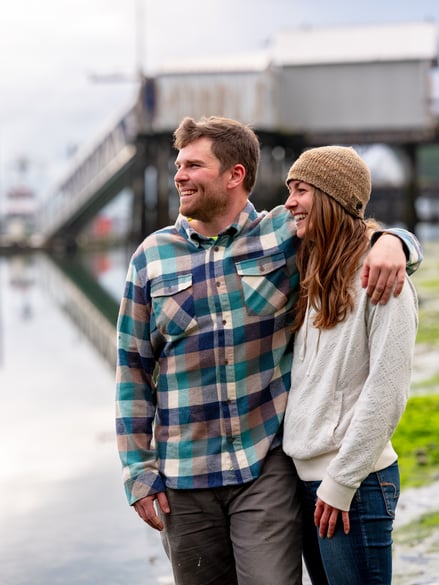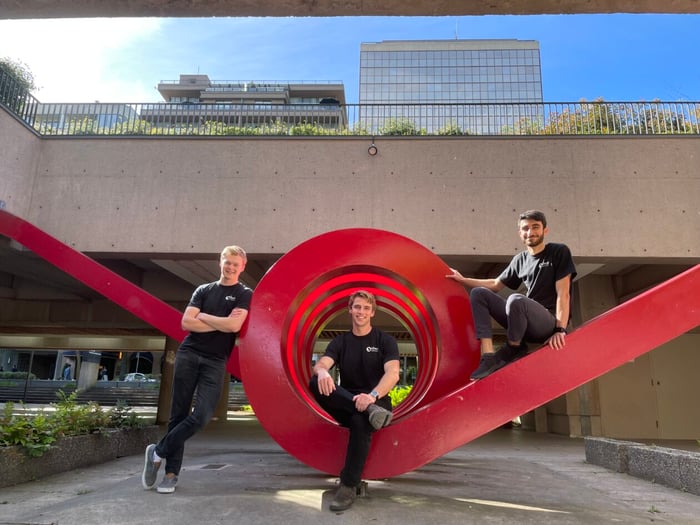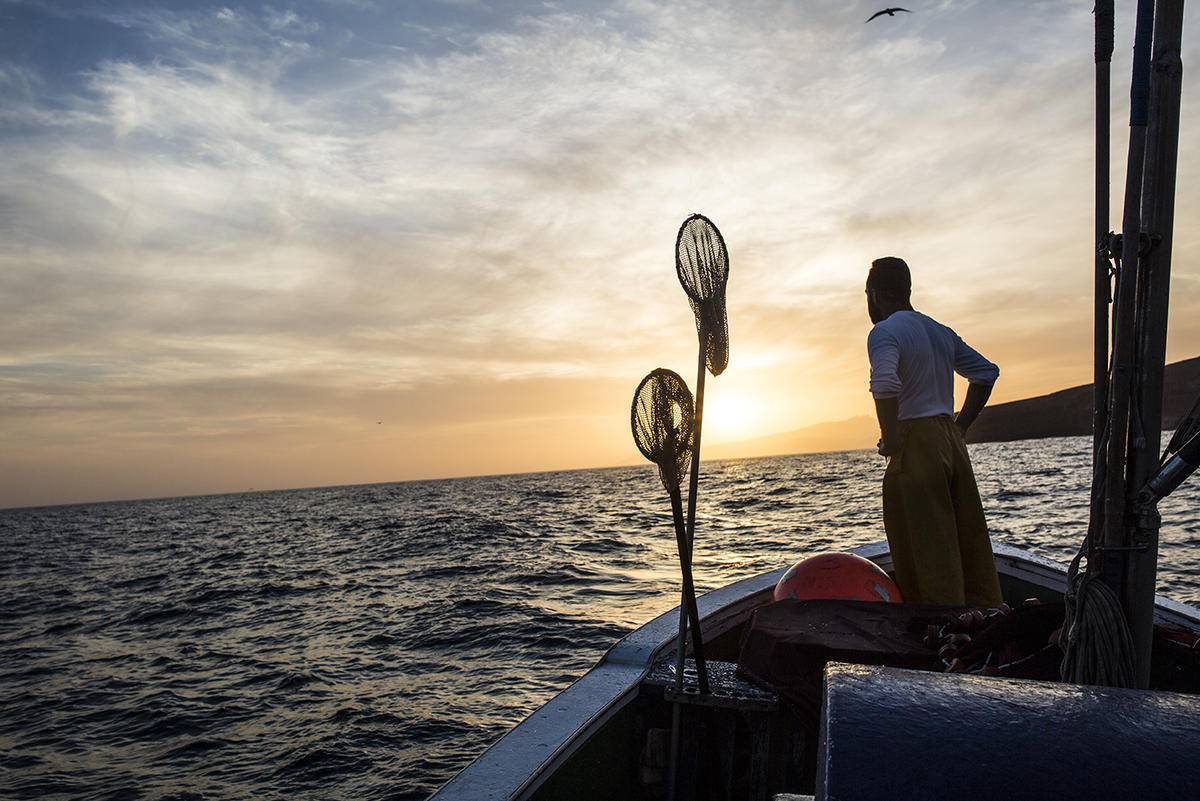Since 2021, Sustainable Ocean Alliance and the Environmental Defense Fund (EDF) Fishery Solutions Center have partnered to provide funding, mentorship, and capacity-building resources to young people through the Leadership for Climate-Resilient Fisheries Fellowship (LCRFF). We're thrilled to host another round of fellows in 2023!
But what does it mean to adapt our fisheries so that they promote ecological, socioeconomic, and community resilience to climate change? Below, meet two of Fellows who are working on just that.
RELATED | Apply for the 2023 Leadership for Climate-Resilient Fisheries Fellowship by April 17, 2023 >>
Noble Ocean Farms | Cordova, Alaska, United States
Noble Ocean Farms grows kelp in a food-insecure region of Alaska, populated by a mix of Alaska Native People and settlers, including a significant Filipino population, many of whom rely on resilient fisheries for social and economic well-being. Founder Skye Steritz, 29, was recruited by an elder of the Eyak Indigenous community to establish a regenerative kelp farm. She was tasked with teaching community members about how they, too, can increase biodiversity, reduce ocean acidification, mitigate climate change, and increase economic self-sufficiency through kelp mariculture.
Addressing inequality and promoting shared economic opportunity
The community of Cordova is home to 2,248 year-round residents, many of whom are Alaska Native and Filipino families, interested in kelp farming, and/or need ways to continue making a living on the water as fisheries decline. Due to the number of families living below the poverty line in Cordova, every child receives free breakfast and lunch at school. The nutrient-dense kelp produced at Noble Ocean was included in local school lunches in 2022.
There are no land-based produce or commercially-grown vegetables in Cordova or any of the remote communities of Eastern Prince William Sound—which makes it even more crucial to build capacity for sea green and sea vegetable cultivation. To date, Noble Farms has trained over 20 locals in kelp farming methods through hands-on workshops, where they shared tools needed to secure regenerative mariculture jobs. Although a culturally significant food in this area, there is also a dearth of knowledge around how to prepare kelp. At festivals and cooking classes, Noble Ocean Farms hands out free samples and teaches people how to cook with it.
Informed by the experience of Indigenous peoples and local communities
In their first two years of operation, Noble Ocean Farms’ nutrient-dense kelp has fed over 1,500 people who face food insecurity in Alaska, including elementary school students, Native Indigenous Elders, and diverse families. Their ongoing conversations with stakeholders (Native tribal members, aspiring kelp farmers, local fishermen, students, the Chugach Regional Resources Commission, and Kelp Farming NGOs like GreenWave) have confirmed the importance of kelp farming in this area. Over the next three years, they aim to build on this knowledge base by training 100 more people in regenerative mariculture techniques.
 Noble Ocean Farms is also informed by the Alaska Mariculture Development Plan, which includes urgent educational priorities to promote regional, sustainable mariculture development by identifying educational opportunities in coastal communities, creating mariculture workshops, and providing training opportunities to start or enhance operations.
Noble Ocean Farms is also informed by the Alaska Mariculture Development Plan, which includes urgent educational priorities to promote regional, sustainable mariculture development by identifying educational opportunities in coastal communities, creating mariculture workshops, and providing training opportunities to start or enhance operations.
Noble Ocean Farms makes business decisions based on fairness and equity and strengthens the resilience of the entire ecosystem through effective management of their kelp farm. Kelp removes excess carbon from seawater, improves water quality, and enhances marine biodiversity.
Noble Ocean Farms is currently growing 1,890 meters of three native seaweed species in Prince William Sound, Alaska. This kelp is decreasing acidification through carbon removal.
Other ecosystem services provided by the kelp farm include providing habitat for dozens of species, including juvenile herring and salmon, rockfish, and invertebrates. Herring populations plummeted and have not recovered since the Exxon Valdez Oil Spill in 1989.
Biodiversity increases on the farm are visible. Studies conducted by University of New England, Theuerkauf et al., and Alleway et al. indicate that compared to non-farming sites, seaweed farms have up to 25% more species (2021.)
Noble Ocean Farms plans to expand to growing 42,672 meters of kelp in the next three years. Scientists they partner with are currently working to estimate and quantify the amount of carbon removal the kelp has now and will have when the farm is fully scaled.
OnDeck Fisheries AI | Vancouver, Canada
The collapse of global fisheries poses a dire threat to both marine species, and to the 10% of the global population that rely on fishing for their livelihoods. Overfishing is a primary contributor to this crisis, which is exacerbated by the inefficiency of current catch monitoring systems. One-third of all fish caught at sea goes unreported due to these flawed manual-review systems, which are expensive, ineffective, and unsustainable. OnDeck Fisheries AI has developed software to enhance the productivity of fisheries monitoring while drastically reducing costs.
Fisheries monitoring currently requires human review—but it can be enhanced for speed and accuracy with OnDeck’s software. To align their product with practitioner needs, OnDeck conducted extensive interviews with the fishing community, earning support from the fisheries community, leading ocean scientists, and nonprofits along the way.

Innovative use of data and digital technologies
Technically speaking, OnDeck's solution solves the problem of inadequate catch monitoring systems by leveraging artificial intelligence and machine learning to automate fish counts in videos recorded by electronic monitoring hardware. This software also allows monitoring agencies to review 100% of fishing activities, as opposed to the typical 10-25%. By automatically detecting whether there is a person, fish, or other fishing activity in the frame, OnDeck is saving hours of manual labor for reviewers, while increasing analysis accuracy. In future iterations, they plan to add species identification and datasets that factor in geo-specific attributes. They predict this technology will be reviewing footage from over 8,000 vessels by 2026.
OnDeck Fisheries AI’s solution is substantially informed and led by the experience of local fishing communities, who are on the frontlines of the crisis of overfishing. The fishing industry is predominantly composed of these small business owners. Over the past year, OnDeck AI has engaged in over 130+ customer interviews with a wide range of stakeholders in the fishing industry. This first-hand input has enabled them to tailor their solution to perfectly meet the needs of this industry.
The increasing accuracy of monitoring reports brought about by the use of OnDeck Fisheries AI, and the fact that this will enable monitoring agencies to monitor 100% of fishing activities (as opposed to only a small percentage), will prevent overfishing and result in more informed policy decisions and yield limits. This will in turn result in better protection of our fisheries and environment, resulting in increased fish stocks, biodiversity, and overall health of marine ecosystems.




 Noble Ocean Farms is also informed by the Alaska Mariculture Development Plan, which includes urgent educational priorities to promote regional, sustainable mariculture development by identifying educational opportunities in coastal communities, creating mariculture workshops, and providing training opportunities to start or enhance operations.
Noble Ocean Farms is also informed by the Alaska Mariculture Development Plan, which includes urgent educational priorities to promote regional, sustainable mariculture development by identifying educational opportunities in coastal communities, creating mariculture workshops, and providing training opportunities to start or enhance operations.
Comments